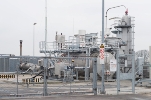
The FRAC Act
To call the practice of hydraulic fracturing, or “fracking,” controversial is a bit of an understatement.
It calls up such strong feelings that pro-fracking signs in New York were graffitied with swastikas and another racial epithet.
Those wielding the cans of spray paint – and other, less-vitriolic environmentalists – cite the danger of contaminating drinking water as well as the hazards posed by the chemicals that resurface after the rock fractures and releases the trapped natural gas. The Clean Water Act exempts this type of gas drilling from federal regulation, meaning companies don’t have to disclose the cocktail of chemicals they use to extract the gas.
Those in favor of fracking say the risks involved with the process are low, and that the benefits of extracting this natural gas make it necessary to continue supplying our energy needs.
Earlier this month, Sen. Robert P. Casey Jr., D-Pa., stepped into the fray, with the introduction of S.B. 587 (known in the world of Congressional acronyms as the FRAC bill). It would require companies to disclose the chemicals they use in the drilling process. In addition to the greater transparency this would bring, disclosure would also provide companies an incentive to use less-toxic substances.
In fact, the Ground Water Protection Council and the Interstate Oil and Gas Compact Commission just put up a website that does the very same thing – although it’s voluntary, and likely won’t have the same effect as mandatory reporting would.
Passage of this bill, in my opinion, can only be a good thing. Anytime we’re dealing with drinking water, tighter regulation is better. This is the stuff that ends up comprising 60 percent of our bodies – why would we oppose measures that aim to make it cleaner?
Indeed, some of my neighbors here in Fort Worth, Texas, where fracking of the Barnett Shale is ongoing, turned on their taps a few months ago to find not water but methane spewing from their faucets. That’s terrifying. Not even the top-of-the-line Brita filter is going to solve that problem.
And that’s why some are saying that bill wouldn’t go far enough, that fracking should be halted and replaced with cleaner forms of energy. That, to me, seems a bit misguided at this point. Natural gas, coal and oil are what power our nation right now. While we do need to move away from them, to wholly reject them and the companies that do the hard, though lucrative, work to procure them would be foolish right now; clean technology is not yet advanced enough to provide affordable – not cheap, but affordable – energy for the whole country.
But this bill would open the door to tightening regulation on an industry that is vital to our daily lives and our country’s economy right now. Though fracking has the potential to be dangerous, with the right regulations, it could be a valuable asset. This bill, then, is a step in the right direction, and it probably shouldn’t be the last step we take.
Everyone has an opinion on fracking – how about you? Do you think we should stop it outright? Or is further study needed?
Posted by Laura Williams on Apr 18, 2011